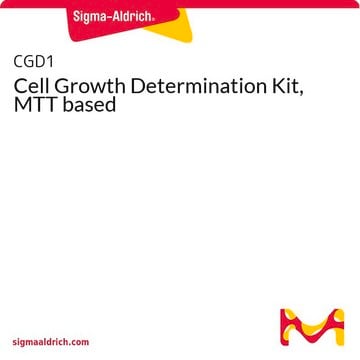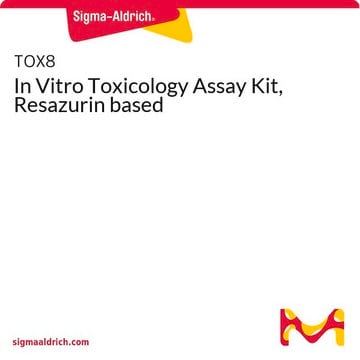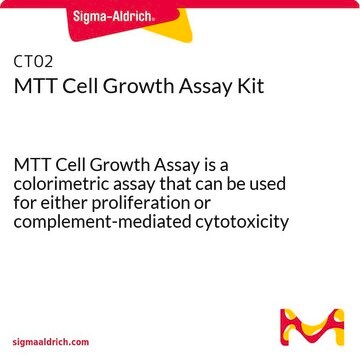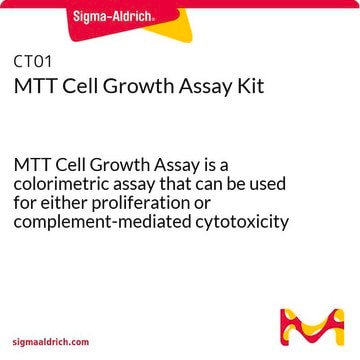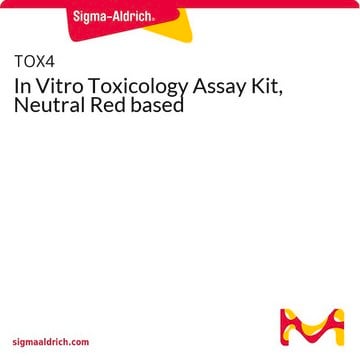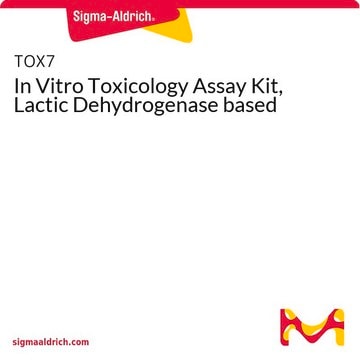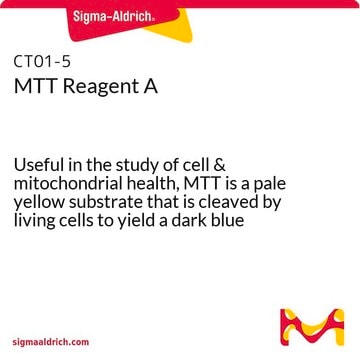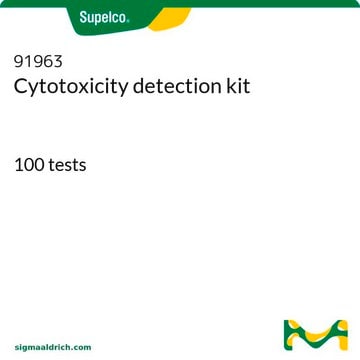TOX1
In Vitro Toxicology Assay Kit, MTT based
Synonym(s):
mitochondrial activity assay
Sign Into View Organizational & Contract Pricing
All Photos(1)
About This Item
UNSPSC Code:
12352207
NACRES:
NA.84
Recommended Products
usage
kit sufficient for 1,000 tests
Quality Level
packaging
pkg of 1 kit
storage condition
dry at room temperature
λmax
570 nm
application(s)
cell analysis
detection
detection method
colorimetric
storage temp.
2-8°C
General description
This kit is designed for determining cell number/ cell viability spectrophotometrically as a function of mitochondrial activity in living cells. The MTT method is simple, accurate and yields reproducible results. The key component is (3- [4,5- dimethylthiazol-2-yl]-2,5-diphenyl tetrazolium bromide) or MTT. Solutions of MTT, dissolved in medium or balanced salt solutions without phenol red, are yellowish in color. Mitochondrial dehydrogenases of viable cells cleave the tetrazolium ring, yielding purple formazan crystals which are insoluble in aqueous solutions. Absorbance of converted dye is measured at a wavelength of 570nm.
Application
In Vitro Toxicology Assay Kit, MTT based has been used to perform an (3-[4,5-dimethylthiazole-2-yl]-2,5-diphenyltetrazolium bromide) MTT assay to measure the cytotoxicity of gold nanoparticles (AuNP). It has also been used to examine cell viability in SH-SY5Y cultures in response to 6-hydroxydopamine (6-OHDA) treatment.
Biochem/physiol Actions
Conversion of MTT to a water-insoluble colored formazan derivative which is then solubilized in acidic isopropanol.
related product
Product No.
Description
Pricing
Signal Word
Danger
Hazard Statements
Precautionary Statements
Hazard Classifications
Aquatic Acute 1 - Aquatic Chronic 2 - Eye Dam. 1 - Flam. Liq. 2 - Muta. 2 - Skin Corr. 1 - STOT SE 3
Target Organs
Central nervous system, Respiratory system
Storage Class Code
3 - Flammable liquids
Flash Point(F)
53.6 °F
Flash Point(C)
12 °C
Choose from one of the most recent versions:
Already Own This Product?
Find documentation for the products that you have recently purchased in the Document Library.
Customers Also Viewed
J Carmichael et al.
Cancer research, 47(4), 936-942 (1987-02-15)
Drug sensitivity assays were performed using a variation of a colorimetric [3-(4,5-dimethylthiazol-2-yl)-2,5-diphenyltetrazolium bromide (MTT)] assay on V79, CHO-AuxB1, CHRC5, NCI-H460, and NCI-H249 cell lines following optimization of experimental conditions for each cell line. Results from this assay were compared with
F Denizot et al.
Journal of immunological methods, 89(2), 271-277 (1986-05-22)
A convenient way to estimate the number of viable cells growing in microtitre tray wells is to use a colorimetric assay and an automatic microplate scanning spectrophotometer. One such assay, developed by Mosmann, depends on the reduction by living cells
Dalia Chávez-García et al.
Journal of biomedical materials research. Part B, Applied biomaterials, 108(6), 2396-2406 (2020-02-06)
Luminescent lanthanide downconversion nanoparticles (DCNPs) provide a combination of high luminescence intensity, sharp emission peaks with narrow bandwidth and a large Stokes' shift, leading to high-performance biomedical applications mainly for imaging. The purpose of this study is to present a
Human renal organic anion transporter 1-dependent uptake and toxicity of mercuric-thiol conjugates in Madin-Darby canine kidney cells
Aslamkhan AG, et al.
Molecular Pharmacology, 63(3), 590-596 (2003)
Srijayaprakash B Uppada et al.
International journal of nanomedicine, 9, 43-53 (2014-01-07)
Oligonucleotides homologous to 3'-telomere overhang (T-oligos) trigger inherent telomere-based DNA damage responses mediated by p53 and/or ATM and induce senescence or apoptosis in various cancerous cells. However, T-oligo has limited stability in vivo due to serum and intracellular nucleases. To
Our team of scientists has experience in all areas of research including Life Science, Material Science, Chemical Synthesis, Chromatography, Analytical and many others.
Contact Technical Service